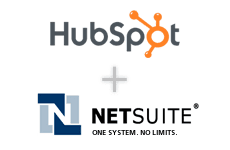
Thinking about integrating HubSpot and NetSuite
Let’s start with company culture, or the cultural way of doing things in your marketing department and your sales department. For most companies, there is a fair amount of antipathy between these two departments. To state it simply, sales thinks they get a lot of “bad leads” from marketing, and marketing thinks that sales doesn’t understand the value of the leads they provide.
Without getting into a discussion of aligning your sales and marketing efforts, let’s just understand that any systems that attempt to force something down the throats of both marketing and sales is doomed to failure.
NetSuite’s Strengths
NetSuite is a business management platform which captures transactional data across an organization from sales and marketing to accounting and purchasing to customer service and e-commerce. The NetSuite platform includes the functionality of traditional ERP and CRM solutions driven from a single, centralized database for your sales team to use. Your sales team may be using NetSuite already and may have developed their own processes and best practices around it.
HubSpot’s Strengths
HubSpot is facile with behavioral analysis of website visitors, but also includes unique features that allow for “smart content,” where the right message gets displayed at the right time to the right person. It also provides state-of-the-art tools for (non-ecommerce) website hosting and blog hosting, along with closed-loop analytics which makes it easy to compute real ROI for your marketing efforts.
Let everyone do what they do best!
Your marketing team is great for creating content, whether it’s in social media, blog posts, web pages or emails. With HubSpot, they quickly learn how to move people down the sales funnel to become a sales-ready lead.
Your sales team, on the other hand, is interested in one thing: closing the sale. NetSuite’s CRM+ is a great tool for them to use. It’s probably what they’re using already, so they won’t have to learn a new tool when you integrate HubSpot with NetSuite.
The HubSpot – NetSuite integration
With this in mind, a basic HubSpot-NetSuite integration would allow marketing to use HubSpot for all tracking, analytics, and communications, with a hand-off to sales for the sales-ready leads (SQLs). New contacts are added to NetSuite, and as contact information changes over time, your CRM+ gets updated. That way, when you turn the lead over to sales, they have a complete picture of all the prospects’ activities and interactions with the company.
Likewise, all non-transactional changes in the customer records in NetSuite should be shared with the contact database in HubSpot for continued communication. Custom fields can be created easily in the HubSpot database to accommodate most recent sale data, lifetime revenue, or other data that would be helpful to marketing for their on-going and future email campaigns.
The integration itself is pretty straight-forward. You map which fields should be shared back and forth, and then update those fields with any changes from either HubSpot or NetSuite. This is all accomplished automatically, in near-real-time.
A successful NetSuite-HubSpot integration keeps Sales and Marketing happy
A successful NetSuite-HubSpot integration keeps sales and marketing happy by letting them use the system they are most familiar with and having them execute on the things they are best at. Both have full customer data sets, and everything is automated. The only piece missing in this happy scenario is a Service Level Agreement (SLA) between Marketing and Sales. This is the topic of a future blog post, but you can start reading about this by downloading the free ebook below.
